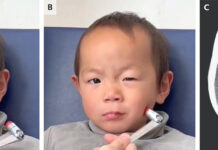Travellers returning from hiking, camping, hunting in the wood, or any such outdoor activities, are at risk of being bitten by an infected tick. Such travellers, upon return, if complain of a tick bite or develop symptoms suggestive of a tick fever even without recalling a bite, should be evaluated further.
The emergency department received two brothers, aged 10 and 12 years with continuous fever and headache for 2 days. The had returned from a trip to South Africa, Mozambique, and Zambia a day before the symptoms developed. Both of them couldn’t recall any tick bite during their excursion.
On examination, both the brothers had eschars (dry, dark, thick, dead pieces of tissue/s), the elder brother had on the calf (Panel A), and the younger sibling had one behind the ear (Panel B) and one on his eyebrow. They both maculopapular rash on the wrists, legs, and trunk. The rashes were non-tender but associated with regional lymphadenopathy.
Thick and thin peripheral smears done to rule out malaria were negative, and so were the blood cultures.
A probable diagnosis of infected mosquito bite was made, and the patient was started on amoxicillin-clavulanate.
By the clinical presentation, multiple eschars in both the brothers pointed towards an alternate diagnosis. Therefore, African tick bite fever (ATBF) was suspected
The brothers were started on doxycycline, which resolved the fever in 24 hours. The treatment was continued for 7 days. Eschars took 2 weeks to resolve.
At the 3-month follow-up, the patients appeared well and had recovered completely with positive serology for rickettsia (the causative bacteria of ATBF), which was initially negative.
Rickettsia africae, the culprit behind ATBF, is a bacteria that is transmitted by Amblyomma ticks, native to sub-Saharan Africa. These ticks feed on livestock and wild animals.
This influenza-like illness is characterized by a history of traveling or outdoor activities, followed by fever, headache, myalgias (muscle pain), rash, regional lymphadenopathy, and inoculation eschars, usually within 2 weeks.
Oral doxycycline is the treatment of choice. The patients usually recover completely within 3 weeks.
A residual scar may persist at the inoculation (eschar) site- a souvenir from the trip!
Is it possible that ATBF transmitted from one brother to the other?
African tick-bite fever is exclusively due to an infected tick bite. Rickettsial infection doesn’t spread from person to person.
Can travelers be vaccinated before traveling to an endemic area?
There is no vaccine yet for the prevention of ABTF.
What precautionary measures can travelers take?
Since there isn’t a vaccine or any medication that can be taken prophylactically, travelers are themselves bound to take measures to prevent ATBF, including the following:
- Try walking in the center of hiking trails, avoid areas with high grass, brush, and leaves.
- Try to minimize the exposed skin surface area. Wear full-sleeved, neutral-coloured clothes, full-length pants, and tuck the pants into socks.
- Apply sunscreen followed by 20%-30% DEET or 20% Picaridin repellants should be used.
- Use a sheet when sitting on the ground.
- Get medical help as soon as you recognize tick bite or associated symptoms.
References
Cindy E. Owen, M., Soon Bahrami, M., Janine C. Malone, M., & al, e. (2006, October). African Tick Bite Fever. Retrieved from JAMA dermatology: https://jamanetwork.com/journals/jamadermatology/fullarticle/408501
Ines Mack, M. a.(2019, March 2019). African Tick-Bite Fever. Retrieved from The New England Journal of Medicine: https://www.nejm.org/doi/full/10.1056/NEJMicm1810093
National Center for Emerging and Zoonotic Infectious Diseases (NCEZID). (2013, March 10). African Tick-Bite Fever. Retrieved from Centers for Disease Control and Prevention: https://wwwnc.cdc.gov/travel/diseases/african-tick-bite-fever
South Africa General Health Risks: African Tick-Bite Fever. (2020, April 16). Retrieved from IAMAT: https://www.iamat.org/country/south-africa/risk/african-tick-bite-fever#




